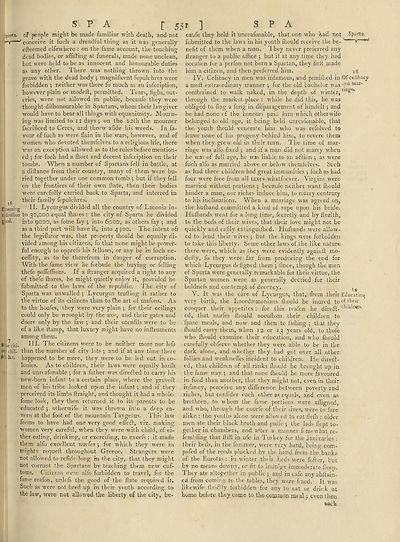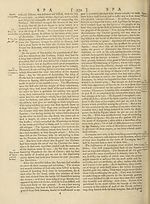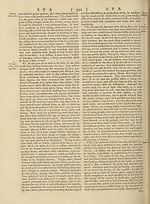Encyclopaedia Britannica, or, a Dictionary of arts, sciences, and miscellaneous literature : enlarged and improved. Illustrated with nearly six hundred engravings > Volume 19, Scripture-SUG
(599) Page 551
Download files
Complete book:
Individual page:
Thumbnail gallery: Grid view | List view

•tonrta.
j.nd«
S P A [5
of people might be made familiar with death, and not
conceive it fueh a dreadful thing as it was generally
efteemed elfewhere : on the fame account, the touching
dead bodies, or affifling at funerals, made none unclean,
!! but were held tube as innocent and honourable duties
as any other. There was nothing thrown into the
grave with the dead body } magnificent fepulchres were
forbidden ; neither was there fo much as an infcription,
however plain or modeft, permitted. Tears, lighs, out¬
cries, were not allowed in public, becaufe they were
thought difhonourable in Spartans, whom their lawgiver
would have to bear all things with equanimity. Mourn¬
ing was limited to n days ; on the 12th the mourner
facrificed to Ceres, and threw afide his weeds. In fa¬
vour of luch as were flain in the wars, however, and of
women who devoted themfelves to a religious life, there
was an exception alhrwed as to the rules before mention¬
ed ; for fuch had a fiiort and decent infcription on their
tombs. When a number of Spartans fell in battle, at
a diilance from their country, many of them were bu¬
ried together under one common tomb *, but if they fell
on the frontiers of their own Rate, then their bodies
were carefully carried back to Sparta, and interred in
their family fepulchres.
teeming If- Lycurgus divided all the country of Laconia in¬
ti divifion to 30,000 equal ftiares : the city of Sparta he divided
into 9000, as fome fay ; into 6oco, as others fay *, and
as a third part will have it, into 4 500. The intent of/
the legiflator was, that property thould be equally di¬
vided among his citizens, fo that none might be power¬
ful enough to opprefs his fellows, or any be in fuch ne-
ceffity, as to be therefrom in danger of corruption.
With the fame view he forbade the buying or felling
thefe pofleffions. If a ftranger acquired a right to any
of thefe (hares, he might quietly enjoy it, provided he
fubmitted to the laws of the republic. The city of
Sparta was umvalled ; Lycurgus trufting it rather to
the virtue of its citizens than to fhe art of rnafons. As
to the houfes, they were A'ery plain ; for their ceilings
could only be wrought by the axe, and their gates and
doors only by the faw ; and their utenfils w'ere to be
of a like ftamp, that luxury might have no inftruments
among them.
III. The citizens were to be neither more nor lets
than the number of city lots ; and if at any time there
happened to be more, they were to be led out in co¬
lonies. As to children, their laws were equally harfli
and unreafonable ; for a father was direfled to carry his
new-born infant to a certain place, where the graved
men of his tribe looked upon the infant •, and if they
perceived its limbs ftraight, and thought it had a whole-
fome look, they then returned it to its parents to be
educated 5 otherwife it was thnwvn into a deep ca¬
vern at the foot of the mountain Taygetus. This law
feems to have had one very good effeft, viz. making
■women very careful, when they were with child, of ei¬
ther eating, drinking, or exercifing, to excels : it made
them alfo excellent nurfes j for which they were in
mightv requeft throughout Greece. Strangers were
not allowed to refide long m the city, that they might
not corrupt the Spartans bv teaching them new cuf-
toms. Citizens were alfo forbidden to travel, for the
fame reafon, unlefs the good of the (late required it.
Such as were not bred up in their youth according to
the kw, were not allowed the liberty of the city,, be-
[7 ..
e citi-
z«« chil-
fap See.
51 ] SPA
caufe they held it unreafonable, that one who had not Sparta,
fubmitted to the laws in his youth fliould receive the be-
nefit of them when a man. 1 hey nevc.r preferred any
llranger to a public office ; but if at any time they had
occafion for a ptrfon not born a Spartan, they firit made
him a citizen, and then preferred him. is
IV. Celibacy in men was infamous, and punifhed in Of celibacy
a molt extraordinary manner ; for the old bachelor was “ncl raar‘
conftrained to walk naked, in the depth of winter, ria^e'
through the market-place : while he did this, he was
obliged to fing a fong in difparagement of himlelt; and
he had none of the honours paid him which otherwife
belonged to old age, it being held unreafonable, that
the youih ffiould venerate him who was refolved to
leave none of his progeny behind him, to revere them
when they grew old in their turn. The time of mar¬
riage was alfo fixed j and if a man did not marry when
he was of full age, he was liable to an adfion ; as were
fuch alfo as married above or below themfelves. Such
as had three children had great immunities ; fuch as had
four were free from all taxes whatfoever. Virgins were
married without portions ; becaufe neither want fhould
hinder a man, nor riches induce him, to marry contrary
to his inclinations. When a marriage was agreed on^
the hufband committed a kind of rape upon his bride.
Huffiands went for a long time, fecretly and by Health,
to the beds of their wives, that their love might not be
quickly and tafily extinguished. Huffiands were allow¬
ed to lend their wives j but the kings were forbidden
to take this liberty. Some other laws of the like nature
there were, which as they were evidently againft mo-
defiy, fo they were far from producing the end for
which Lycurgus defigned them ; finee, though the men
of Sparta wrere generally remarkable for their virtue, the
Spartan women were as generally decried for their
boldnefs and contempt of decency. j
V. It was the care of Lycurgus, that, from their Education
very birth, the Lacedaemonians fliould be inured totheir
conquer their appetites for this reafon he direft- chll|L««v,
ed, that nurfes fhould accuffom their children to
fpare meals, and now and then to faffing ; that they
ffiould carry them, when 1 2 or 13 years- old, to thole
wffio ffiould examine their education, and who fhould
carefully obferve whether they were able to be in the
dark alone, and whether they had got over all other
follies and weaknefies incident to children. He direct¬
ed, that children of all ranks fhould be brought up in
the fame w’ay ; and that none fliould be more favoured,
in food than another, that they might not, even in their
infancy, perceive any difference between poverty and
riches, but confider each other as equals, and even as
brethren, to whom the fame portions were affigned,
and who, through the courfe of the ir iives, W'cre to fare
alike : the youths alone ivere allowed to eat fleffi : older
men ate their black broth and pulfe j the lads flept to¬
gether in chambers, and a+ter a manner fe me-what re-
fembling that flill in ufe in Turkey for the janizaries :
their beds, in the fummer, were very hard, being corn-.
pofed of the reeds plucked by the hand from the banks
of the Eurotas : in winter their beds were fofter, but
by no means downy, or fit to indulge immoderate fieep.
They ate altogether in public-, and in cafe any abftain-
ed from coming to the tables, they were fined. It was
likewife ftritfJy forbidden for any to eat or drink at
home before they came to the common meal; even then
each
j.nd«
S P A [5
of people might be made familiar with death, and not
conceive it fueh a dreadful thing as it was generally
efteemed elfewhere : on the fame account, the touching
dead bodies, or affifling at funerals, made none unclean,
!! but were held tube as innocent and honourable duties
as any other. There was nothing thrown into the
grave with the dead body } magnificent fepulchres were
forbidden ; neither was there fo much as an infcription,
however plain or modeft, permitted. Tears, lighs, out¬
cries, were not allowed in public, becaufe they were
thought difhonourable in Spartans, whom their lawgiver
would have to bear all things with equanimity. Mourn¬
ing was limited to n days ; on the 12th the mourner
facrificed to Ceres, and threw afide his weeds. In fa¬
vour of luch as were flain in the wars, however, and of
women who devoted themfelves to a religious life, there
was an exception alhrwed as to the rules before mention¬
ed ; for fuch had a fiiort and decent infcription on their
tombs. When a number of Spartans fell in battle, at
a diilance from their country, many of them were bu¬
ried together under one common tomb *, but if they fell
on the frontiers of their own Rate, then their bodies
were carefully carried back to Sparta, and interred in
their family fepulchres.
teeming If- Lycurgus divided all the country of Laconia in¬
ti divifion to 30,000 equal ftiares : the city of Sparta he divided
into 9000, as fome fay ; into 6oco, as others fay *, and
as a third part will have it, into 4 500. The intent of/
the legiflator was, that property thould be equally di¬
vided among his citizens, fo that none might be power¬
ful enough to opprefs his fellows, or any be in fuch ne-
ceffity, as to be therefrom in danger of corruption.
With the fame view he forbade the buying or felling
thefe pofleffions. If a ftranger acquired a right to any
of thefe (hares, he might quietly enjoy it, provided he
fubmitted to the laws of the republic. The city of
Sparta was umvalled ; Lycurgus trufting it rather to
the virtue of its citizens than to fhe art of rnafons. As
to the houfes, they were A'ery plain ; for their ceilings
could only be wrought by the axe, and their gates and
doors only by the faw ; and their utenfils w'ere to be
of a like ftamp, that luxury might have no inftruments
among them.
III. The citizens were to be neither more nor lets
than the number of city lots ; and if at any time there
happened to be more, they were to be led out in co¬
lonies. As to children, their laws were equally harfli
and unreafonable ; for a father was direfled to carry his
new-born infant to a certain place, where the graved
men of his tribe looked upon the infant •, and if they
perceived its limbs ftraight, and thought it had a whole-
fome look, they then returned it to its parents to be
educated 5 otherwife it was thnwvn into a deep ca¬
vern at the foot of the mountain Taygetus. This law
feems to have had one very good effeft, viz. making
■women very careful, when they were with child, of ei¬
ther eating, drinking, or exercifing, to excels : it made
them alfo excellent nurfes j for which they were in
mightv requeft throughout Greece. Strangers were
not allowed to refide long m the city, that they might
not corrupt the Spartans bv teaching them new cuf-
toms. Citizens were alfo forbidden to travel, for the
fame reafon, unlefs the good of the (late required it.
Such as were not bred up in their youth according to
the kw, were not allowed the liberty of the city,, be-
[7 ..
e citi-
z«« chil-
fap See.
51 ] SPA
caufe they held it unreafonable, that one who had not Sparta,
fubmitted to the laws in his youth fliould receive the be-
nefit of them when a man. 1 hey nevc.r preferred any
llranger to a public office ; but if at any time they had
occafion for a ptrfon not born a Spartan, they firit made
him a citizen, and then preferred him. is
IV. Celibacy in men was infamous, and punifhed in Of celibacy
a molt extraordinary manner ; for the old bachelor was “ncl raar‘
conftrained to walk naked, in the depth of winter, ria^e'
through the market-place : while he did this, he was
obliged to fing a fong in difparagement of himlelt; and
he had none of the honours paid him which otherwife
belonged to old age, it being held unreafonable, that
the youih ffiould venerate him who was refolved to
leave none of his progeny behind him, to revere them
when they grew old in their turn. The time of mar¬
riage was alfo fixed j and if a man did not marry when
he was of full age, he was liable to an adfion ; as were
fuch alfo as married above or below themfelves. Such
as had three children had great immunities ; fuch as had
four were free from all taxes whatfoever. Virgins were
married without portions ; becaufe neither want fhould
hinder a man, nor riches induce him, to marry contrary
to his inclinations. When a marriage was agreed on^
the hufband committed a kind of rape upon his bride.
Huffiands went for a long time, fecretly and by Health,
to the beds of their wives, that their love might not be
quickly and tafily extinguished. Huffiands were allow¬
ed to lend their wives j but the kings were forbidden
to take this liberty. Some other laws of the like nature
there were, which as they were evidently againft mo-
defiy, fo they were far from producing the end for
which Lycurgus defigned them ; finee, though the men
of Sparta wrere generally remarkable for their virtue, the
Spartan women were as generally decried for their
boldnefs and contempt of decency. j
V. It was the care of Lycurgus, that, from their Education
very birth, the Lacedaemonians fliould be inured totheir
conquer their appetites for this reafon he direft- chll|L««v,
ed, that nurfes fhould accuffom their children to
fpare meals, and now and then to faffing ; that they
ffiould carry them, when 1 2 or 13 years- old, to thole
wffio ffiould examine their education, and who fhould
carefully obferve whether they were able to be in the
dark alone, and whether they had got over all other
follies and weaknefies incident to children. He direct¬
ed, that children of all ranks fhould be brought up in
the fame w’ay ; and that none fliould be more favoured,
in food than another, that they might not, even in their
infancy, perceive any difference between poverty and
riches, but confider each other as equals, and even as
brethren, to whom the fame portions were affigned,
and who, through the courfe of the ir iives, W'cre to fare
alike : the youths alone ivere allowed to eat fleffi : older
men ate their black broth and pulfe j the lads flept to¬
gether in chambers, and a+ter a manner fe me-what re-
fembling that flill in ufe in Turkey for the janizaries :
their beds, in the fummer, were very hard, being corn-.
pofed of the reeds plucked by the hand from the banks
of the Eurotas : in winter their beds were fofter, but
by no means downy, or fit to indulge immoderate fieep.
They ate altogether in public-, and in cafe any abftain-
ed from coming to the tables, they were fined. It was
likewife ftritfJy forbidden for any to eat or drink at
home before they came to the common meal; even then
each
Set display mode to:
![]() Universal Viewer |
Universal Viewer | ![]() Mirador |
Large image | Transcription
Mirador |
Large image | Transcription
Images and transcriptions on this page, including medium image downloads, may be used under the Creative Commons Attribution 4.0 International Licence unless otherwise stated. ![]()
| Permanent URL | https://digital.nls.uk/192703069 |
|---|
| Attribution and copyright: |
|
|---|
| Description | Ten editions of 'Encyclopaedia Britannica', issued from 1768-1903, in 231 volumes. Originally issued in 100 weekly parts (3 volumes) between 1768 and 1771 by publishers: Colin Macfarquhar and Andrew Bell (Edinburgh); editor: William Smellie: engraver: Andrew Bell. Expanded editions in the 19th century featured more volumes and contributions from leading experts in their fields. Managed and published in Edinburgh up to the 9th edition (25 volumes, from 1875-1889); the 10th edition (1902-1903) re-issued the 9th edition, with 11 supplementary volumes. |
|---|---|
| Additional NLS resources: |
|

